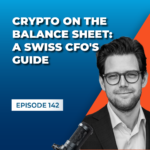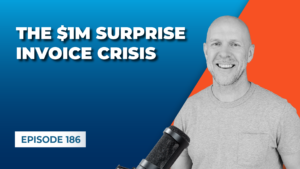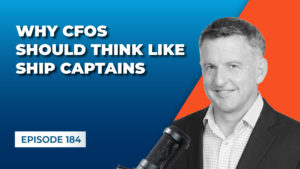James Kennedy sits down with Kevin Leuthardt, Swiss tax-lawyer-turned–fractional CFO and founder of 3K, to demystify “crypto on the balance sheet.” They separate hype from reality with two practical buckets: Bitcoin as (emerging) store of value and stablecoins as fast, low-cost rails for payments. Kevin explains the new ETF moment for Bitcoin, how to think about custody, accounting classification, covenants, and valuation, and where stablecoin payments can beat wires for speed and fees – plus what can go wrong and how to de-risk it.
About Kevin Leuthardt
Based in Zurich, Kevin started in Big Law/Tax advising token issuers in 2017, moved in-house to a crypto startup to run finance, and now leads 3K, a hands-on advisory providing fractional CFO, accounting, audit support, and tax for Web3 projects and for traditional companies exploring crypto treasury and payments.
What You’ll Learn
- Value store vs. payment rail: Why Bitcoin looks increasingly like “digital gold,” while stablecoins (e.g., USDC) have found product-market fit for cross-border payments.
- Accounting treatment 101: Cash equivalent? Inventory? Intangible? How classification affects balance-sheet presentation, mark-to-market, P&L volatility, and bank covenants.
- Custody choices & controls: Self-custody (hardware wallets) vs. regulated custodians/exchanges – and the counterparty risk trade-offs.
- Stablecoin mechanics & risk: How pegs work, why de-pegs can happen, and why using stablecoins just-in-time for payments limits exposure.
- When speed matters: Retainers, deposits, and time-sensitive deals that benefit from minute-level settlement and fees measured in cents (vs. days and hefty wire charges).
Episode Highlights
- “Bitcoin’s store-of-value case strengthens as institutions arrive via ETFs – but it’s still volatile, so size it like a diversifier, not your entire treasury.”
- “Before you buy, decide your accounting policy: classification, valuation, disclosure. It will save pain with auditors, tax authorities, and lenders.”
- “Banks love stability. If BTC swings run through your P&L, covenants can get twitchy.”
- “Stablecoin payments can settle in minutes at ~$0.01 fees. Great for cross-border retainers and urgent vendor prepayments.”
- “You don’t have to ‘become a crypto company’ to benefit – accept in stablecoin, convert out quickly, and keep exposure low.”
More About Kevin’s Role
At 3K, Kevin helps Web3 teams and mainstream businesses with:
- Crypto finance stack: from wallet policy and custody to closing, reporting, and audit readiness
- Accounting & tax posture: clear memos on classification, valuation, and disclosures to align auditors and regulators
- Payments enablement: safely accepting stablecoins, implementing convert-on-receipt flows, and documenting controls
- Treasury advisory: measured diversification (e.g., BTC/ETPs) aligned to risk tolerance and lender expectations




